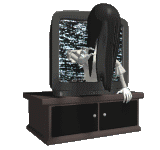| The Age of Show Business |
Chapter
6, pp. 83-98.
|
 |
|
Amusing
Ourselves to Death, previous
Postman Chapter |
||
|
"These quixotic uses of television
to ridicule the hope harbored by some that television can
be used to support the literate tradition."
Exactly what Marshall Mcluhan
called "rear-view mirror" thinking
p. 83. "Television does not extend or amplify literate culture. It attacks it. If television is a continuation of anything, it is of a tradition begun by the telegraph and the
photograph in the mid-nineteenth century, not by printing press in
the fifteenth.
p. 84.
Four questions posed (for the rest of the book) 1
What is television? 2
What kinds of conversations does it permit? 3
What are the intellectual tendencies it encourages? 4
What sort of culture does it produce? "making a distinction
between a technology and a medium." "technology is to a medium
(media) as the brain is to the mind" physical purpose, or function media –"the use to which
the physical apparatus is put" technology "employs a a particular symbolic code." "A medium is the social and intellectual environment
a machine creates." "like the brain itself,
every technology has an inherent bias." "Each
technology has an agenda of its own." Thus Newer tool is not an "amplification of an older
one;"
The automobile is not a "fast horse"
The heat/light bulb is not "a powerful candle"
Ð The television not a talking book You "misconstrue entirely how television redefines
the meaning of public discourse." What does TV do? 84 "television has a bias." "television will not
have the same meaning or power as it does in America." 85 "its full potentiality
as a technology of images" G.B. Shaw "beautiful – if you cannot read." Commercial medium "exquisitely crafted, always
pleasing to the eye and accompanied by exciting music." "the best of photography
in the world is presently seen on television commercials." 86 banality of explaining and exploring
the details of entertaining television "Not that television is entertaining, but that it has made enetertainment itself the natural
format for the representation of all experience." 87 "Entertainment is the supra-ideology of all discourse
on television." "it is there for our
pleasure and amusement." 87 "A news show, . . . is a format for entertainment." 87-88 Day After as "televangelical"
discourse: Shown on ABC, November 20, 1983 "here was television
taking the most serious responsible stance." "a critical test of television's
capacity to depart from an entertainment mode." Subject: nuclear
holocaust Attacked as subversive Important to get the seriousness—gravitas—of
the message right "was not intended to
be a debate, but a discussion." 89 the issue " nuclear arms
reduction." 15
proposals, not seriously discussed! "But it is not time constraints alone that produce
such fragmented and discontinuous language." 90 "It tends to reveal people in the act of thinking." "There is not much to see in it." "political understanding
being brought to heal by a medium that requires them to fashion performances
rather than ideas." 91 Sagan –"the logical scientist speaking on
behalf of the planet." (Koppel, Kissinger, Scowcroft, McNamara – 15
proposals for arms reduction) "that is to say applause,
not reflection." 91 "use television as a
carrier of coherent language or thought process." "complex talk does not
play well on television." 92
"The
single most important fact about television is the people watch it." "Americans no longer talk to each other, they
entertain each other." 92 "They do not exchange ideas, they exchange images." 92-93 Religion and Rock n/ Roll" Roman Catholic priest in Chicago on TV "The Journey Inward, Father Greg Sakowicz – "You don't have to be boring in order to be holy" 93 A televised surgery –
authentic—and more carefully done? 1984 curriculum idea where children had their "curriculum
sung to them." "Childern's Television
Workshop, "Sesame Street"
–"merely attempte to make learning
to read a form of light entertainment." 94 "Hegel's dialectical method" and the gimmick
of "running into walls." 95 "Amish are forbidden to see movies or to be photographed."
Except 1984, Lancaster Pa. for the fiming
of the movie: Witness. 96 How The Age of Show Business replaces the Age of Exposition, conclusion "The Genesis project" of making the Bible
into a movie. "on 225 hours of film" 96 Meryl Streep at Yale "out-applaused" Mother Theresa, 1983 96-97. 1984 Presidential Elections:
President (Actor) Ron Reagan vs. Senator Fritz
Mondale Contrasted unfavorably with the Lincoln Douglas debates "on several occasions
syntax was abandoned entirely." "giving off impressions, which television does best." "Our culture has moved toward a new way of conducting its business – even important business. Experts must answer not to the rigors of their disciplines,
but to the bar of "good showmanship." 97-98 "There is no business, but show business." p. 98 |
||
|
Chapter
7, Now . . . This. "A conjunction that does not connect anything
to anything but does the opposite: separates everything from everything." p. 99 Can we survive if we take the measure of the world
in twenty –two minutes? Is the value of our news determined
by the number of laughs it provides? p. 113 |
||

